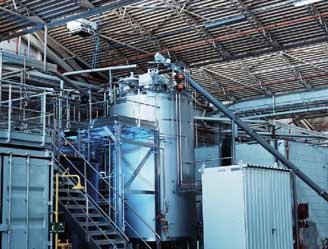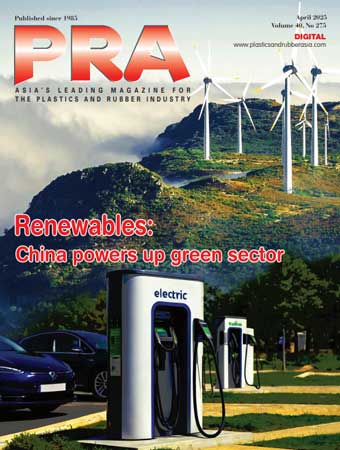Green tie-ups: Freepoint/Source One to develop recycling infrastructure in Europe; Carbios/Indorama/Michelin in r-PET tie-up for tyre textile filaments

Freepoint Eco-Systems International Ltd and Source One GmbH have entered into a long-term collaboration agreement to develop multiple pretreatment facilities to treat waste streams, such as post-consumer waste (PCR), to support the growth of pyrolysis infrastructure across Europe.
Under the agreement, Freepoint Eco-Systems plans to build a network of pretreatment installations in key European markets, with Source One acting as the Engineering, Procurement and Construction (EPC) contractor. These facilities will convert mixed plastic waste into high-quality feedstock suitable for both advanced and mechanical recycling.
Source One says it has developed a unique pretreatment concept that has already been proven in commercial-scale operation to be capable of producing feedstock that meets the requirements of both pyrolysis and mechanical processing. Designed to handle complex waste streams, such as mixed plastic packaging and flexible films, the system reduces energy use and environmental impact and sets a new benchmark for quality, operational efficiency, and compliance with evolving regulatory expectations.
"This collaboration marks the beginning of a strategic partnership focused on unlocking the value of plastic waste," said Jacco de Haas, Chief Commercial Officer, Recycling Europe, at Freepoint Eco-Systems. "By combining our feedstock strategy with Source One's best-in-class pretreatment platform, we are building critical infrastructure that enables pyrolysis to scale commercially and competitively."
The planned cooperation agreement aligns with Freepoint Eco-Systems' broader ambition to become a leading supplier of feedstock for advanced recycling in Europe. Material from these facilities will supply Freepoint Eco-Systems' own pyrolysis plants and support other upcycling initiatives across the continent.
"Partnering with Freepoint Eco-Systems provides the crucial capacity needed to make resource-efficient plastic use reality across Europe," says Kai Hoyer, founder and CEO of Source One GmbH. "Together, we're advancing the circular economy by leveraging cutting-edge recycling technologies and accelerating the high-quality recovery and reuse of plastics."
The agreement establishes a foundation for infrastructure aligned with European regulatory drivers, including the Green Deal, the Circular Economy Action Plan, and the Packaging and Packaging Waste Regulation (PPWR), which mandate the increased use of recycled content in plastic packaging. By addressing a key bottleneck in the plastic value chain, the collaboration between Freepoint Eco-Systems and Source One aims to strengthen material recovery while enabling the responsible use of plastic resources across Europe.
In other news, French biotechnology firm Carbios has announced the signing of a multi-year commercial agreement with Thai integrated chemical firm Indorama Ventures. This agreement covers the supply of biorecycled monomers from its Longlaville plant, which will be transformed into r-PET filaments by Indorama and then integrated by French tyre maker Michelin into the manufacturing of its tyres.

Thanks to its enzymatic PET recycling technology, Carbios will produce monomers from complex PET waste at its future industrial site in Longlaville. Indorama will handle the repolymerisation and production of technical filaments. Michelin will use these materials in its tyre reinforcements.
This commercial agreement is part of the pre-commercialisation momentum of Carbios’s future industrial site in Longlaville, just weeks after signing the first sales contracts for biorecycled PET with global cosmetics leaders, L'ORÉAL and L'Occitane en Provence.
Vincent Kamel, CEO of Carbios said, “This commercial agreement with Indorama Ventures marks a new step in the realisation of our industrial project. It confirms the trust of Indorama Ventures and Michelin in our PET biorecycling technology. Alongside the commercial successes already achieved in cosmetic packaging applications, this agreement illustrates our ability to deliver innovative solutions to the most demanding industries, particularly industrial filaments for tire applications and, more broadly, textile.”
Fabien Gaboriaud, Director of Circularity and Renewable & Recycled Materials at Michelin Group, conferred, “This partnership is a tangible expression of our commitment to turning complex waste into high-performance materials. By integrating enzymatically recycled r-PET into our tyres, we are marking a new milestone on our journey toward achieving 100% renewable and recycled materials by 2050 — all while staying within planetary boundaries. It is by combining innovation, industrial excellence, and close collaboration with trusted partners that we are building a strong and lasting circular model.”
Carbios’s industrial demonstration plant for biorecycling has been operational since 2021, and construction of the world’s first biorecycling plant is expected to resume in the second half of 2025, subject to securing the necessary additional funding.
The company is supported by prestigious brands in the cosmetics, food, and apparel industries, aiming to improve the recyclability and circularity of their products. Nestlé Waters, PepsiCo, and Suntory Beverage & Food Europe are members of a packaging consortium founded by Carbios and L’Oréal. On, Patagonia, Puma, PVH Corp and Salomon collaborate with Carbios in a textile consortium.
(PRA)SUBSCRIBE to Get the Latest Updates from PRA Click Here»










